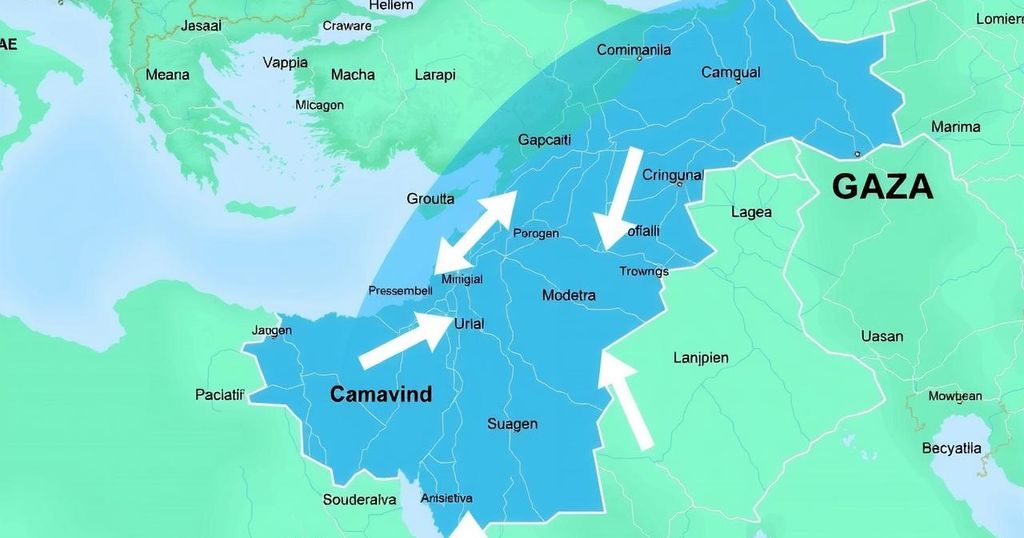President Trump continues to advocate for a Gaza reconstruction plan that excludes Hamas, while the White House criticizes the Egyptian proposal as inadequate. Recent talks among regional officials address reconstruction and governance in Gaza, with Israel voicing concerns over the plan’s feasibility without addressing Hamas’s violent history. Meanwhile, Egypt endorses a $53 billion phased plan aimed at restoring Gaza by 2030, acknowledging the need for Gulf funding. Both the White House and Israel argue that lasting peace requires the removal of Hamas from power.
President Donald Trump remains steadfast in his vision for Gaza, irrespective of ongoing discussions in the region. National Security Council spokesperson Brian Hughes indicated that the Egyptian reconstruction proposal fails to acknowledge the severe conditions currently in Gaza and emphasizes President Trump’s commitment to rebuilding Gaza free from Hamas influence. Hughes expressed the expectation for continued negotiations aimed at fostering peace and prosperity in the area.
Recent reports, including one from Reuters, revealed that senior officials from the United States, Egypt, Qatar, and Hamas convened for discussions. These meetings also addressed future governance plans for Gaza, reflecting a collaborative approach among these nations in the context of Trump’s Gaza strategy.
The Israeli Foreign Ministry has raised significant concerns about the Egyptian proposal, supported at a recent Arab summit in Cairo. The Ministry criticized the plan for neglecting the violence that occurred on October 7, 2023, and the persistent threat posed by Hamas. It stated that the proposal relied on outdated perspectives, failing to acknowledge the repercussions of Hamas’s actions, specifically the tragic fatalities and kidnappings that ensued.
Hamas has expressed support for the Egyptian plan, reflecting the challenges facing reconstruction efforts in Gaza, particularly concerning Hamas’s ongoing influence. Egypt’s comprehensive 112-page reconstruction proposal includes phased rebuilding efforts by 2030 with an estimated $53 billion investment. The plan encompasses debris clearance, expansion of Gaza’s coastal area, and the construction of essential infrastructure such as housing units, airports, and recreational spaces.
While Egyptian leaders have advocated for a temporary technocratic administration in Gaza, they acknowledge the necessity for significant financial contributions from Gulf Arab states for the initiative’s success. Previously hesitant about Gaza’s reconstruction, Egypt now feels pressured to devise an alternative strategy after ruling out the possibility of hosting displaced Palestinians for national security reasons. President Abdel-Fattah el-Sissi emphasized the need for a plan that allows Palestinians to remain on their land without displacement.
Consequently, the White House and Israel maintain that a comprehensive solution, aimed at removing Hamas from power, is imperative for achieving enduring peace and stability in the region. This ongoing situation illustrates the intricate dynamics at play regarding Gaza’s future amid geopolitical interests.
In summary, President Trump’s commitment to a Gaza relocation plan persists despite competing proposals, particularly from Egypt. The dialogue among various nations highlights the complex dynamics involved in Gaza’s reconstruction, with significant concerns raised by Israel regarding any plan that does not address Hamas’s actions. As the Egyptian initiative unfolds, the emphasis remains on securing substantial financial backing and governance mechanisms essential for rebuilding Gaza while ensuring the safety of its residents. Ultimately, a comprehensive resolution focusing on the elimination of Hamas’s influence is deemed crucial for lasting peace in the region.
Original Source: www.wfiwradio.com






